Perimeter timeline, 25th anniversary
2025
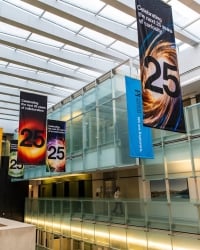
Perimeter Institute celebrates its 25th anniversary.
2024
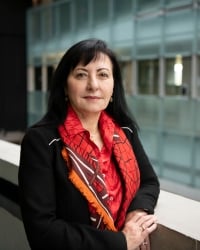
Marcela Carena named Perimeter’s next Executive Director.
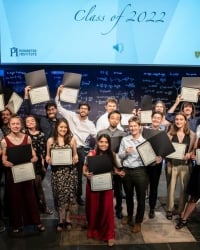
The Perimeter Scholars International Master’s program graduates its 15th class.

The Dark Energy Spectroscopic Survey (DESI) releases its first results, mapping the universe in more detail than ever before and hinting at new insights into dark energy.
Perimeter Partners with Let’s Talk Science to bring physics to more young Canadians.

Both the Federal and Provincial governments renew support for the Institute.
Perimeter’s exceptional educational outreach resources and program earn the 2024 APS Excellence in Physics Education Award.

Cosmology 101 premieres, where viewers can join Katie Mack, Perimeter Institute’s Hawking Chair in Cosmology and Science Communication, on an incredible journey through the cosmos in our new series.
2023

Perimeter launches a new research initiative to work in collaboration with the Dark Energy Spectroscopic Instrument (DESI) to map the universe in unprecedented detail and ask fundamental questions about the universe’s evolution.
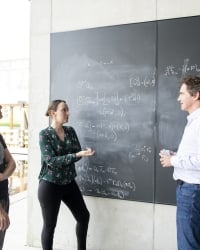
A new Simons collaboration on celestial holography, seeking to unite gravity and quantum mechanics, begins research.
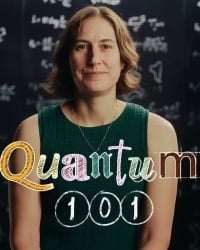
Quantum 101 premieres, allowing watchers to join Katie Mack, Perimeter Institute’s Hawking Chair in Cosmology and Science Communication, over 10 short forays into the weird, wonderful world of quantum science.
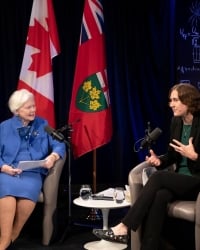
The inaugural Emmy Noether National Forum, moderated by The Honourable Elizabeth Dowdeswell, Lieutenant Governor of Ontario, takes place at Perimeter.
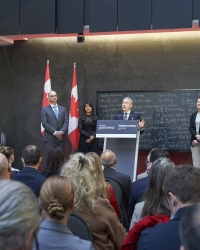
The federal government announces Canada’s national quantum strategy at Perimeter.
2022
Thousands vote for the best physics equation in Physics Frenzy: Battle of the Equations.
Perimeter launches a new initiative in Small Scale Experiment Design, to search for new particles and do fundamental science using tabletop-sized experiments.
Perimeter launches its Celestial Holography initiative, seeking to unite quantum mechanics with General Relativity in scenarios approaching those found in our own universe.
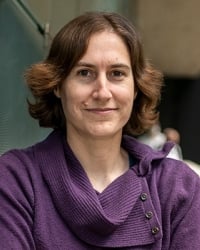
Katie Mack joins Perimeter as the Institute's first outreach faculty member, holding the Hawking Chair in Cosmology and Science Communication.

The Event Horizon Telescope gives us the first glimpse at the Milky Way’s own supermassive black hole, Sagittarius A*.
2021

The Canadian Hydrogen Intensity Mapping Experiment (CHIME) announces that it detected more than 500 Fast Radio Bursts in its first year of operation.
Michael Serbinis takes over as chair of Perimeter’s Board of Directors.
Perimeter hits 100,000 YouTube subscribers.
2020
Perimeter’s Daniel Family James Peebles Chair in Theoretical Physics Kendrick Smith wins the New Horizons in Physics Prize for “the development of novel techniques to extract fundamental physics from astronomical data.” In the same year, Clay Riddell Paul Dirac Chair in Theoretical Physics Pedro Vieira also wins a New Horizons in Physics Prize, for “profound contributions to the understanding of quantum field theory.”
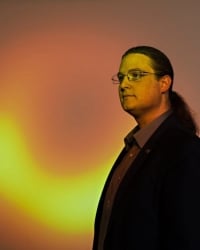
The Event Horizon Telescope (EHT) Collaboration, which includes Perimeter Institute, wins the 2020 Breakthrough Prize for taking the first image of a supermassive black hole.
Perimeter launches its Quantum Causal Inference initiative to probe cause-and-effect in quantum physics and beyond.
Perimeter launches the Clay Riddell Centre for Quantum Matter, a research hub focused on uncovering and discovering new states of matter.
The Institute launches an organization-wide plan for inclusion, diversity, equity, and accessibility, in partnership with Shift Health.
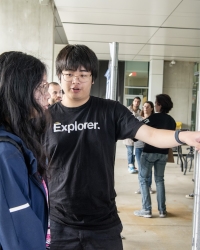
The Institute launches PSI Start, its undergraduate theoretical physics summer program, giving top undergrads rare research experience.
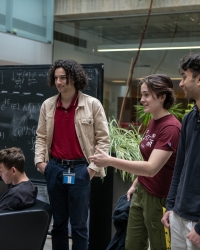
The Perimeter Scholars International master’s program celebrates its tenth newly arrived class of students.
2019
Singer/songwriter Ron Sexsmith performs at Perimeter.

In partnership with the University of Waterloo’s Institute for Quantum Computing (IQC), Perimeter launches the Quantum Simulations of Fundamental Interactions (QFun) initiative to improve simulation techniques and answer questions in fundamental science.
Perimeter launches its Gravitational Waves research initiative to find new ways to probe fundamental questions about the universe using these ripples in spacetime.

Portrait of a black hole: The Event Horizon Telescope takes the first picture of a black hole, an achievement long believed to be impossible. Perimeter researchers are a core piece of the EHT project.

Fast radio bursts: The Canadian Hydrogen Intensity Mapping Experiment (CHIME) radio telescope, powered by algorithms and software developed at Perimeter, showed that repeating "Fast Radio Bursts" are a ubiquitous phenomenon in our universe. FRBs quickly became an enticing puzzle, whose explanation provides new details about exotic and extreme phenomena that manifest in our universe.
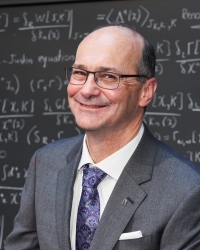
Founding faculty member Robert Myers becomes the Institute’s new Director in 2019.
2018

The Canadian Hydrogen Intensity Mapping Experiment (CHIME) detects its first ‘Fast Radio Burst’ (FRB), an enigmatic pulse coming from the night sky. Perimeter researchers helped develop the software for CHIME, and begin working to understand FRBs.

The Perimeter Institute Quantum Information Laboratory (PIQuIL) opens its doors, seeking to break new ground at the intersection of quantum science and artificial intelligence.

The Wilkinson Microwave Anisotropy Probe (WMAP) cosmic microwave background project wins the 2018 Breakthrough Prize, including Perimeter’s Daniel Family James Peebles Chair in Theoretical Physics Kendrick Smith. Starting in 2003, the WMAP team created the most detail map of the universe ever made. Completed in 2013, the experiment launched a new era of precision cosmology and resulted in some of the highest-cited papers across all fields of science.
Perimeter faculty and staff form the grassroots “Inclusive PI Platform,” and the Institute appoints its first Equity, Diversity, and Inclusion Specialist.
The Quantum to Cosmos animated website reveals the scale of the universe from the infinite, to the infinitesimal.
2017
Perimeter’s Stavros Niarchos Foundation Aristarchus Chair in Theoretical Physics Asimina Arvanitaki wins the New Horizons in Physics Prize for “pioneering a wide range of new experimental probes of fundamental physics”.
The Simons Foundation awards a TGI grant to scale up the Emmy Noether Fellowship program for early- and mid-career women in physics.
Perimeter’s magazine, Inside the Perimeter, releases its first issue.
Perimeter launches the Centre for the Universe, a major initiative and global focal point for cross-disciplinary research into key questions in cosmology.
The dawn of multi-messenger astronomy: When LIGO-Virgo observed two colliding neutron stars, Perimeter researchers were ready. “It’s opening the door to amazing physics,” said astrophysicist and Deputy Faculty Chair Luis Lehner. “This is all just the beginning – the very first event.”
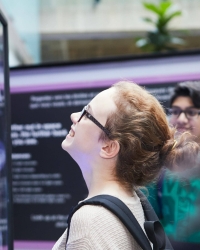
As part of Innovation150, the Power of Ideas National Tour crossed Canada with a traveling exhibition, presentations, and activities designed to inspire the next generation of innovators. The tour reached more than 100,000 visitors in more than 190 communities, including many remote and rural locations.
2016

Perimeter’s Forces of Nature poster series launches, featuring influence women from across physics and down through history.
Perimeter Partners with ICTP-SAIFR to build a strong summer school program.
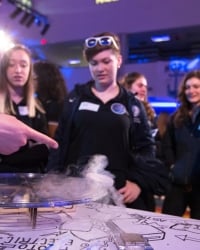
Perimeter becomes a lead partner of Innovation150, a signature initiative of Canada 150, the celebration of Canada’s sesquicentennial.

A new independent report from KPMG says, “Perimeter has successfully positioned Canada as a world leader in theoretical physics research, and its influence on Canada’s reputation in foundational theoretical physics is significantly higher than just five years ago.”

Prime Minister Justin Trudeau explains quantum computing, during an announcement of renewed funding for the Institute.
2015

Perimeter holds the first Inspiring Future Women in Science conference.
Perimeter researchers Philip Schuster and Natalia Toro win the New Horizons in Physics Prize for “pioneering the ‘simplified models’ framework for new physics searches at the Large Hadron Collider, as well as spearheading new experimental searches for dark sectors using high-intensity electron beams.”
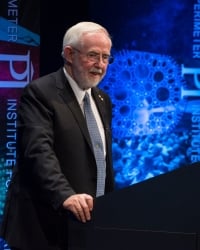
Perimeter Board Member Art McDonald wins the 2015 Nobel Prize in Physics for his work on Neutrinos at SNOLAB.
Perimeter launches its Discretuum to Continuum initiative to build computational tools for uniting general relativity and quantum mechanics.
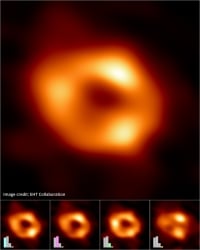
Avant le Déluge: Perimeter Institute builds a team of researchers and students to conduct leading-edge analysis of astrophysical data collected by the Event Horizon Telescope. The EHT will collect a torrent of new data over the next several years, and the EHT Initiative at Perimeter aims to be the world’s foremost hub for analysis of this data.
2014
Perimeter launches a new research initiative on Tensor Networks, a powerful tool for describing strongly entangled quantum many-body systems.
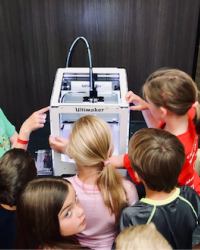
Perimeter’s educational outreach activities reach one million students this year, via classroom modules, teacher training, and summer school programs.
Perimeter’s Gluskin Sheff/Onex Freeman Dyson Chair in Theoretical Physics Freddy Cachazo wins the New Horizons in Physics Prize for “uncovering numerous structures underlying scattering amplitutes in guage theories and gravity.”
2013
The Tri-Institute Summer School on Elementary Particles (TRISEP), a two-week summer school in particle physics for graduate students and postdoctoral researchers, is held for the first time. This is a partnership between Perimeter, TRIUMF, and SNOLAB.
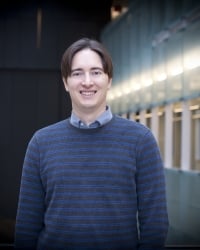
Perimeter’s Krembil Galileo Galilei Chair in Theoretical Physics Davide Gaiotto wins the inaugural New Horizons in Physics Prize for “Far-reaching new insights about duality, gauge theory, and geometry, and specially for his work linking theories in different dimensions in most unexpected ways.”
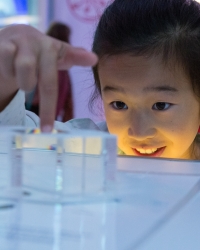
The BrainSTEM Festival connects remarkable technological innovations to the scientific breakthroughs that make them possible. The festival features interactive science-centre style exhibits, special presentations, public lectures, Science in the Club events, and self-guided building tours. More than 25,000 attendees include Canada’s Governor General, David Johnston.
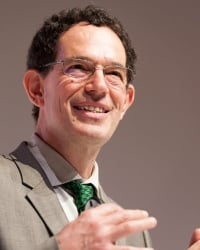
Neil Turok begins second term as Director
Perimeter partners with the Fields Institute and the University of Toronto to fund joint postdoctoral fellowships for African nationals.
An independent international study from the Max Planck Society ranks Perimeter second in theoretical physics, behind only Princeton’s Institute for Advanced Study.
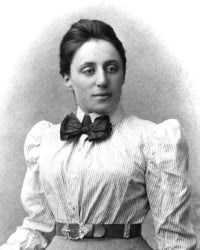
The first Emmy Noether Fellowships support early- and mid-career women physicists.
2012
Japanese visual & sound artist Ryoji Ikeda performs at Perimeter Institute.

Stephen Hawking’s second research visit to Perimeter Institute.
Perimeter Director Neil Turok delivers the 2012 CBC Massey Lectures to sold-out audiences across Canada. A text version of the lectures is titled “The Universe Within.”
Musician Laurie Anderson performs at Perimeter.
The BrainSTEM “unconference,” a collaboration between Perimeter and Communitech, brings together experts in digital science communication, including Henry Reich from MinutePhysics, Derek Muller from Veritasium, Destin Sandlin from SmarterEveryDay, and many others.
2011
Violinist Joshua Bell performs at Perimeter Institute.
Director Neil Turok became a member of Canada's Science, Technology and Innovation Council.
An independent, third-party KPMG review of Perimeter Institute says “research conducted within PI’s core fields are of great importance…reaching groundbreaking, revolutionary, and transformative levels.”
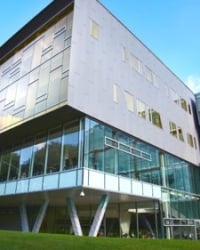
The universe keeps expanding, so why not the Institute? The Stephen Hawking Center opens, more than doubling the size of the facility. The design strategy focuses on balancing quiet spaces for research and contemplative thought with spaces designed to facilitate interaction.
2010
The Carnegie Group of G8 Science Ministers come to Perimeter. Guests included Canada’s federal funding minister, Gary Goodyear.

During his visit to Perimeter, Prime Minister Stephen Harper announces $20 million to help the Institute’s Global Outreach department in its work to establish AIMS centres of excellence in Ethiopia, Ghana, and Senegal. The Prime Minister also announced the creation of the Banting Fellowships.
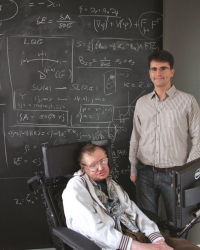
Stephen Hawking spends six weeks at the Institute. The presence of the famous physicist inspires many other Perimeter researchers to describe the beauty of the universe’s mathematical mysteries. TVO Report.
2009
Perimeter and the University of Waterloo launch the Waterloo Global Science Initiative to catalyze collective action regarding the United Nations Sustainable Development Goals.
The Quantum to Cosmos outreach festival attracts more than 40,000 attendees in person and more than a million viewers online.
Alice and Bob in Wonderland debuts — a series of animated shorts explaining concepts in theoretical physics.
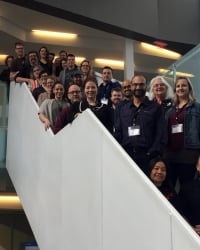
Perimeter launches its groundbreaking Teacher Network, a connection hub that provides high school science teachers with training and resources to share with other educators via professional development workshops.

Perimeter now has the largest and most diverse Quantum Foundations group in the world.
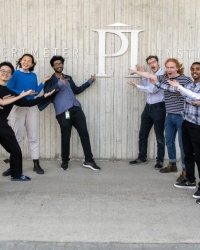
The Institute launches Perimeter Scholars International (PSI), a master's program focused on theoretical physics, designed to bring exceptionally motivated and highly qualified graduate students to the foreground of cutting-edge physics while offering an intensive and interactive training environment.
2008
The first annual Luke Santi Memorial Award is presented to high school student Paul Brogee.
Stephen Hawking becomes Perimeter’s first Distinguished Visiting Research Chair.
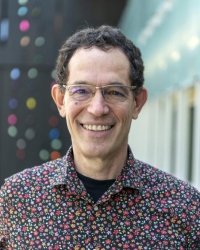
Neil Turok appointed as Perimeter’s next Director.
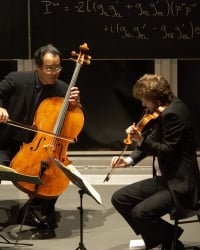
Cellist Yo-Yo Ma performs at Perimeter Institute.
2007
The famous Hayden-Preskill Protocol was developed during visits to Perimeter. The acknowledgments of the paper read: “We are grateful for the hospitality of the Perimeter Institute, where we had the good fortune to share an office, and JP thanks PH for letting him use the comfortable chair.”
Founding Director Howard Burton leaves to pursue other interests. Founding faculty member Robert Myers is named Interim Director.

At age six, the Institute had already gone through a major growth spurt, with 85 resident researchers including nine faculty, 11 associate faculty, 34 postdoctoral fellows, and 31 graduate students. Perimeter was home to six active research groups with a prolific output including 187 publications garnering 2006 citations.
2006
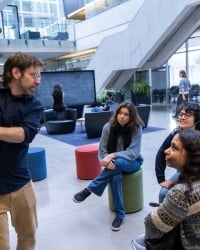
By 2006, more than 300 scientific visitors were coming to Perimeter each year to work and collaborate.
A new high school outreach program, Physica Phantastica, takes Perimeter science inside the classroom.
An independent assessment by the Natural Sciences and Engineering Research Council of Canada says: “Perimeter has been a great success on a world-wide scientific scale, for Canadian science, and for education and outreach. A number of major research achievements can be attributed directly to the existence of PI.”
2005
Perimeter's ArtTalk speaker series included renowned photographer Ed Burtynsky - and music producer Brian Eno.
Public lectures this year include Leonard Susskind, Anton Zeilinger, and Ed Witten.
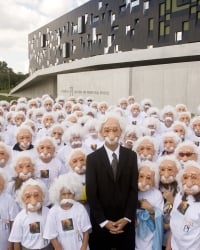
Perimeter hosts its first major outreach event, EinsteinFest, as part of the International Year of Physics. With more than 28,000 attendees, it is the world’s biggest celebration of Einstein’s centenary.
Perimeter’s cultural and artistic activities begin to ramp up, with the Grammy-winning Kronos Quartet performing on February 1, 2005.
In January 2005 Perimeter’s Black Hole Bistro, an atmospheric meeting place and watering hole for hungry physicists, serves its first meals.
2004
Perimeter’s summer school for high school students, ISSYP, expands to include international students.
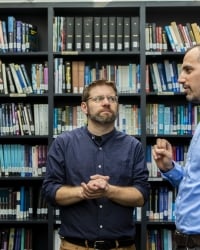
Perimeter’s library is named in memory of George Leibbrandt, an early Perimeter supporter and Board member.

A public open house held on October 2 saw over 8,000 people attend lectures, participate in events, and take tours.

Perimeter’s new custom facility, a 65,000-square-foot building designed by Saucier + Perotte, opens its doors on October 1. Scientific speakers at the grand opening include Jim Hartle, Juan Maldacena, Roger Penrose, Scott Tremaine, Jorge Pullin, Paul Steinhardt, Tony Leggett, and Steve Weinberg. Canadian Prime Minister Paul Martin, as well as federal dignitaries Kevin Lynch, Tom Brzustowski (who was head of NSERC at the time), Art Carty (National Science Advisor), and Cal Stiller (Chair of the ORDCF). Ontario Minister of Economic Development and Trade Joe Cordiano attended, as did local MPPs Elizabeth Witmer and John Milloy.
2003
The earliest lecture on PIRSA, Perimeter’s free online database of scientific talks and lectures, is uploaded.
In August, Perimeter’s summer school for high school students, later to become ISSYP, runs for the first time. It was called the ‘National Summer Institute’, and included students from across Canada.
On February 21, Perimeter holds its first high school teacher training program, the precursor to EinsteinPlus.
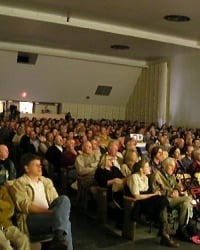
Monthly public lectures now regularly draw more than 350 attendees.
2002
Perimeter launches its first-ever outreach program for high school students led by Richard Epp.
Robert Myers organizes the first conference at Perimeter: The Montreal-Rochester-Syracuse-Toronto (MRST) Conference on Theoretical Physics.
April 2002: first edition of a PI newsletter.
Perimeter Institute’s first website goes live.
The University of Waterloo’s Institute for Quantum Computing is launched, with Perimeter’s founding faculty member Raymond Laflamme serving as its first Director.
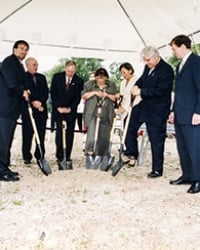
On June 14, the groundbreaking ceremony for Perimeter’s new build is attended by Canadian Prime Minister Jean Chrétien, Minister of Industry Allan Rock, and Deputy Premier of Ontario Elizabeth Witmer.

The governments of Ontario and Canada commit $15 million (over three years) and $25 million (over five years) respectively to Perimeter Institute. Additional public funding from a $5.6 million CFI grant, and a $6 million Ontario Research and Development Challenge Fund (split equally with the Institute for Quantum Computing), set Perimeter in a strong position to pursue its mission.
2001
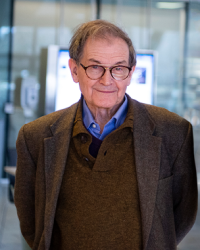
Roger Penrose gives Perimeter’s first public lecture in October.
Research operations began in October 2001 with nine internationally recognized scientists. These include three long-term researchers: Lee Smolin and Fotini Markopoulou for quantum gravity, and Robert Myers for string theory; two associate members: Raymond Laflamme and Michele Mosca (both later cross-appointed with the new Institute for Quantum Computing at the University of Waterloo); and four postdocs: Olaf Dreyer and Oliver Winkler (quantum gravity), and John Brodie and Konstantin Savvidis (string theory). This core group expands to 24 people within a year.
The first researchers walk through Perimeter's doors. The ‘Old Post Office’ building at 35 King St. Waterloo, Ontario, Canada serves as the Institute’s first campus.
The external scientific community gets the first close look at Perimeter Institute in March 2001. A representative scientific advisory committee reports that “Perimeter is a remarkably bold experiment. Its mission is tightly focused on research, on fundamental physics, and on the development of a highly interactive, tightly knit community of colleagues. Perimeter has the potential to become the most important new, privately funded institute in theoretical physics since the founding of the Institute for Advanced study 70 years ago.”
2000
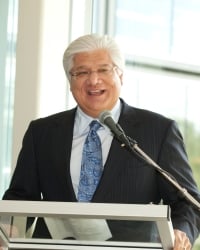
Perimeter Institute officially launches on October 23, 2000.
1999

In 1999, RIM founder Mike Lazaridis gives $100 million – one third of his fortune – to establish an institute for theoretical physics. He hires Howard Burton as Perimeter’s first Director and forms a Board of Directors.
